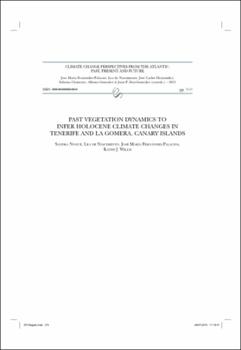Past vegetation dynamics to infer holocene climate changes in Tenerife and La Gomera, Canary Islands
Fecha
2013Resumen
Oceanic islands in the low latitudes, as the Canary Islands, are generally considered to have been well buffered from the climate change of the Quaternary period. However, questions remain about whether past climatic changes on Atlantic islands are synchronic with those occurring in Africa and the Mediterranean coast or if the climate remained stable during the Holocene. Here we used fossil pollen and charcoal time series on Tenerife and La Gomera in order to: 1) provide the first inter-island picture of vegetation dynamics through the last 9600 years of this important biodiverse region of Europe; 2) detect the vegetation sensitivity, mainly tree communities, to past climatic changes; and, 3) provide evidences for human-induced changes at this potentially highly informative point. Preliminary analyses suggest very little climate change for the period 4000 years to present, but this requires confirmation by reference to additional coring sites. In La Gomera, we found strong evidences of a shift towards drier conditions at around 5500 years ago. The general vegetation pattern observed was a decrease in hygrophilous trees (Canarian palm and willow) and an expansion of Morella-Erica woody heath. Our results provide the first evidence to suggest that the general Northern Africa and Mediterranean shift towards drier conditions may be traced in the Canary Islands.






